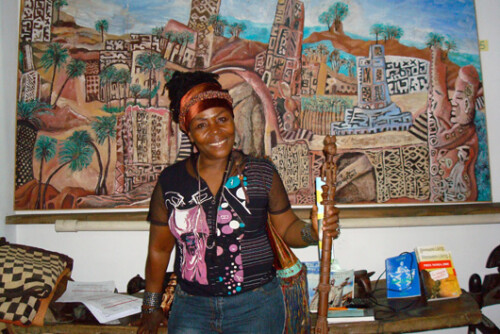Conclusion: Resisting Erasure
After the publication of the first edition of his influential text Slave Rebellion in Brazil: The Muslim Uprising of 1835 in Bahia (1995), João José Reis received much criticism from scholars for his failure to mention the crucial role of African descendant women, such as Luisa Mahim, in the urban anti-slavery revolt. In his article, for instance, Ari Lima (2001) asks readers to name a black woman in Brazilian history who comes immediately to mind. As I read Lima’s article, I remember the day in 2003, when I walked into a t-shirt shop in Salvador, a majority black city in northeastern Brazil, to purchase a gift. A t-shirt with the title “Panteras Negras (Black Panthers)” caught my eye, but the pictures printed on it included the portraits of Che Guevara, César Chavez, Fidel Castro, and Zumbí. The absence of black women illustrated the local and national collective amnesia of black women’s history in Brazil—and black women’s radicalism globally. I mentioned this to the saleswoman, and she told me, “You’re right, but who would you include?” I quickly offered the names of Angela Davis, Nanny of the Maroons, Nzinga, and other women Black Panthers in the United States, the Caribbean, and Africa, but I was much slower to provide a similar list of black Brazilian and other Latin American women. As organizers of Day of the Black Woman in Bahia in 2008 emphasized, “Women such as Maria Filipa fought for in the war for independence in Bahia, but they are not remembered on July 2nd [Independence Day], Zeferina, Luisa Mahim.” Who are the black women warriors of Brazil, specifically, and of Latin America, in general? Knowledge production on the lives of black women in Brazilian history continues to be rare, and black women have been erased from political memories of gendered anti-racism struggles, such as the abolition movement (Butler 1998) and the more recent struggles for policy reform in education and health care (Santos 2007). My commitment to unburying the political activism, writings, and legacies of black women feminists in Latin America intensified upon this realization.
In recent years, I have begun to collect black women’s feminist writings from Latin America to organize an anthology that follows Beverly Guy-Sheftall’s Words of Fire: An Anthology of African-American Feminist Thought (1995). No such anthology of Latin American black feminist writings exists, and this essay begins to frame why such an intellectual and political project is necessary. These writings need to be written into the long history of the line of “sisters” throughout the African diaspora who have struggled against slavery, colonialism, and gendered racial and class oppression. As “academic others,” their contributions to feminist thought, critical theories of race and diaspora, and black political radicalism continue to be minimized, marginalized, or erased, despite the fact that they have no doubt contributed to the black radical tradition and the black feminist agenda in the Americas (James 2002; Ransby 2003). Black feminists in Latin America are oftentimes left out of narrations of the black radical tradition in the Americas—thus they are the “sister outsiders” of the region. This leads me to two questions: Within black diaspora studies, how do we begin to understand the idea and practice of a black geographic context of feminist solidarity, and how significant are “nations” and “regions” in building radical black political communities?
This essay calls for an important need to document black women’s radical tradition in Latin America, specifically the scholarship and activism grounded in feminist consciousness, diasporic identification, and grassroots politics. An anthology of black feminist writings in Latin America will provide a nuanced understanding of the diasporic relationship between black women, bringing awareness of their disparate experiences at the center of transnational solidarity. In essence, such an intellectual and activism project represents our efforts to further black women’s politics against gendered and class-based racism in the Americas and elsewhere. However, the challenge for African diaspora studies remains the centrality (or the forging) of black women’s histories, experiences, and knowledge in the formation of a global black diaspora community. This essay encourages us to rethink the relationship between black diaspora studies and black feminist studies, for, as Asale Angel-Ajani laments, “African diaspora studies fail women miserably,” (2006). Moreover, it remains a challenge for black diaspora and black feminist scholars in the U.S. to increase their knowledge of black women’s thought and praxis throughout the Americas. Engaging black feminists in Latin America and allowing a black diasporic vision to emerge deepens black feminism’s radical possibility of global sisterhood and the convergence of common struggles.
Works Cited
Angel-Ajani, Asale. “Displacing Diaspora: Trafficking, African Women, and Transnational Practices.” Diasporic Africa: A Reader. Ed. Michael A. Gomez. New York: New York University Press, 2006: 290-308.
Bairros, Luiza. “III Conferencia Mundial Contra o Racismo.” Estudos Feministas 1 (2002): 169-170.
Basu, Amrita, ed. The Challenge of Local Feminisms: Women’s Movements in Global Perspective. Boulder, CO: Westview Press, 1995.
Beato, Lúcila Bandeira. “Inequality and Human Rights of African Descendants in Brazil.” Journal of Black Studies 34, no. 6 (2004): 766-786.
Brah, Avtar. Cartographies of Diaspora: Contesting Identities. New York: Routledge, 1996.
Davies, Carole Boyce. Left of Karl Marx: The Political Life of Claudia Jones. Durham, NC: Duke University Press, 2008.
González, Lélia. “For an Afro-Latin Feminism.” Confronting the Crisis in Latin America: Women Organizing for Change. Isis International & Development Alternatives With Women For a New Era, 1988: 95-101.
Guy-Sheftall, Beverly. Words of Fire: An Anthology of African-American Feminist Thought. New York: New Press, 1995.
Lima, Ari. “A Legitimação do Intellectual Negro no Meio Acadêmico Brasileiro: Negação de Inferioridade, Confronto ou Assimilação Intelectual.” Afro-Ásia 25-26 (2001): 281-312.
Lovell, Peggy. “Race, Gender and Work in São Paulo, 1960-2000.” Latin American Research Review 41 (1999).
Lovell, Peggy and Charles Wood. “Skin Color, Racial Identity, and Life Chances in Brazil.” Latin American Perspectives 25 (1998).
McCallum, Cecilia. “Women out of Place? A Micro-historical Perspective on the Black Feminist Movement in Salvador da Bahia, Brazil.” Journal of Latin American Studies 39 (2007): 55-80.
Marable, Manning. “Groundings with my Sisters: Patriarchy and the Exploitation of Black Women.” Traps: African American Men on Gender and Sexuality. Ed. Rudolph P. Byrd and Beverley Guy-Sheftall. Bloomington: Indiana University Press, 2001.
Mohanty, Chandra Talpade. Feminism Without Borders: Decolonizing Theory, Practicing Solidarity. Durham, NC: Duke University Press, 2003.
Red de Mujeres Afrocaribeñas y Afrolatinoamericanas.”Memoria del Tercer Encuentro de la Red de Mujeres Afrolatinoamericanas, Afrocaribeñas y de la Diaspora.” 2006.
Reis, João José. Slave Rebellion in Brazil: The Muslim Uprising of 1835 in Bahia. Baltimore, MD: The Johns Hopkins University Press, 1995.
Rodney, Walter. The Groundings with my Brothers. Chicago, IL: Frontline Distribution International, 1969.
———. Walter Rodney Speaks: The Making of An African Intellectual. Trenton, NJ: Africa World Press, 1990.
Safa, Helen I. “Racial and Gender Inequality in Latin America: Afro-descendent Women Respond.” Feminist Africa: Diaspora Voices 7 (2006): 49-66.
Santos, Sonia Beatriz dos. “Feminismo Negro Diaspórico.” Gênero 8, no. 1 (2007): 11-26.
Souza, Neuza Santos. Tornar-se Negro. Rio de Janeiro: Edições Graal, 1983.


![On [Not] Watching the Video](https://sfonline.barnard.edu/wp-content/uploads/2019/09/Seeds-of-Justice-COVER-1-e1571082420171-500x334.jpg)
